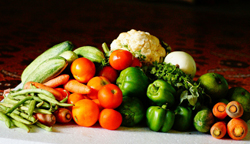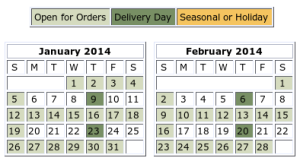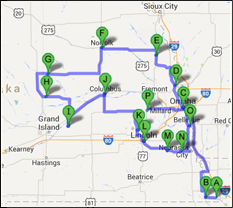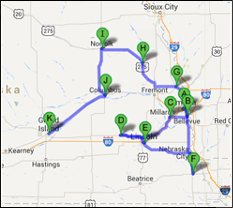
Many schools in Nebraska are now buying local fruits and vegetables for their school food programs. Farmers can learn how to participate in these growing “farm to school’ initiatives in a series of free training sessions offered in the Loup Basin RC & D area in February and March.
“Farmers can access an increasing market for fresh produce while providing healthy food to children in their community,” said Wyatt Fraas, lead trainer for the project. “At these sessions, farmers will learn what schools are looking for and how to assure them that their crops are clean and safe.”
Six Loup Basin area communities will host the two-part series of workshops. In the first round of sessions, “The Business of Selling to Schools”, farmers will learn how to sell foods to local schools, including business basics and marketing, regulations, and production practices.
In the second of the two-part series, “Farmers are Food Handlers, too”, farmers will learn ways to use and document a “safe food handling plan” that satisfies concerns of school and retail food buyers and also reduces risk of food contamination on the farm.
Training sessions are sponsored by the Loup Basin Resource Conservation and Development Council of Burwell and by the Center for Rural Affairs. Funding for the project is provided in part by USDA Rural Development.
Trainings will be held in the following six locations in February and March:
Ord, Volunteer Fire Hall, 1628 M St. from 1-4 pm on February 25 and March 4
Loup City, Community Center, 803 O. St. from 1-4 pm on February 26 and March 5
Spalding, Clear Creek Organic Farms, 82228 499th Ave. from 1-4 pm on February 27 and March 6
St. Paul, Miletta Vista Winery, 1732 Highway 281 from 1-4 pm on March 11 and March 18
Burwell, Sandstone Grill, 416 Grand Ave. from 1-4 pm, March 12 and March 19
Broken Bow, Custer Public Power, 625 E. South E St. from 1-4 pm, March 13 and 20
Visit www.loupbasinrcd.org for more information, or contact Sarah Smith, Center for Rural Affairs Farm to School Coordinator at 307.321.9766 or sarahs@cfra.org, or Janet Sanders, Executive Director of Loup Basin RC&D at 308.346.3393 or info@loupbasinrcd.org.

 “We as a society and as an economy need to start optimizing for a large number of small things, not just relying on a small number of large things.”
“We as a society and as an economy need to start optimizing for a large number of small things, not just relying on a small number of large things.”





